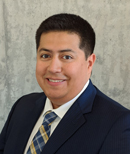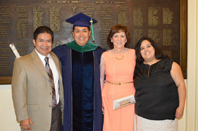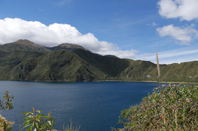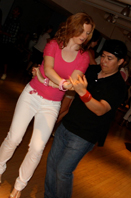Interview with David Arboleda, MD
A Conversation with David Arboleda, Clinical Instructor
Where were you born and raised? Tell me about your family — what you really like about them.
 I was born in Quito, Ecuador. My grandparents originally lived in a house with dirt floors but through hard work were able to move into the city and support a family of 10. My grandfather worked in a bank, and he was proud and strict so that no one would dare get into trouble, but he would provide occasional little luxuries like chocolate when he could. My parents are both general internal medicine physicians who had done their mandatory post-graduate work in rural communities in underserved areas. We lived with my grandparents because that's what young families, just getting started, did. As a young couple, my parents set up a little office for consultations but they both felt that Medicine wasn't practiced well in what Ecuador was, a third world country; there weren't formal residencies, it was more like apprenticeships where they shadowed senior doctors until they were deemed a specialist. That, plus the political situation at the time, made them realize that they wanted to come to America so they left their families and moved to Queens, New York, where I was eventually raised. My aunt and family friends, really great people, helped them get situated. What I really like most about my parents was that they always prioritized education and their children. If the choice was about making life easier for themselves or spending money and time to make things better for us in school, they always chose education and family. They instilled in me a sense of what my priorities will be when I have my own family.
I was born in Quito, Ecuador. My grandparents originally lived in a house with dirt floors but through hard work were able to move into the city and support a family of 10. My grandfather worked in a bank, and he was proud and strict so that no one would dare get into trouble, but he would provide occasional little luxuries like chocolate when he could. My parents are both general internal medicine physicians who had done their mandatory post-graduate work in rural communities in underserved areas. We lived with my grandparents because that's what young families, just getting started, did. As a young couple, my parents set up a little office for consultations but they both felt that Medicine wasn't practiced well in what Ecuador was, a third world country; there weren't formal residencies, it was more like apprenticeships where they shadowed senior doctors until they were deemed a specialist. That, plus the political situation at the time, made them realize that they wanted to come to America so they left their families and moved to Queens, New York, where I was eventually raised. My aunt and family friends, really great people, helped them get situated. What I really like most about my parents was that they always prioritized education and their children. If the choice was about making life easier for themselves or spending money and time to make things better for us in school, they always chose education and family. They instilled in me a sense of what my priorities will be when I have my own family.
Are your parents still practicing Medicine and where?
 They've moved several times and my father is still one of the last solo practitioners in Florida. When I graduated from college, he started his own practice, which I helped manage, where he treats primarily a Spanish-speaking, uninsured, underserved population and he is really happy. My mom works for the Health Department in Population Health and Maternity, despite that her pay has been frozen for over a decade. My younger sister is the reason I came to California and is an industrial organizational psychologist with Google, who studies the science behind how to test, motivate, evaluate people for large organizations. She is one of the most generous people I've ever met, resilient and strong. Like zero generation immigrants, we as a family pursued opportunities, and I hope that this is the place where we can set down roots.
They've moved several times and my father is still one of the last solo practitioners in Florida. When I graduated from college, he started his own practice, which I helped manage, where he treats primarily a Spanish-speaking, uninsured, underserved population and he is really happy. My mom works for the Health Department in Population Health and Maternity, despite that her pay has been frozen for over a decade. My younger sister is the reason I came to California and is an industrial organizational psychologist with Google, who studies the science behind how to test, motivate, evaluate people for large organizations. She is one of the most generous people I've ever met, resilient and strong. Like zero generation immigrants, we as a family pursued opportunities, and I hope that this is the place where we can set down roots.
Can you recollect an aroma that brings you back to that childhood?

My first memory is of being in a crib with a big wool blanket on top of me, because we lived in the mountains in Ecuador, and looking out of a window with crisp mountain air rushing in. I remember the snow-covered volcano in the early morning and the smell of the mountain air. I am so fortunate now to live so close to the ocean and the mountains where there are so many great places to hike and ski
To what grove does your surname trace back?
It's a Spanish surname but I don't know about its origins other than it means, "grove." There is much resentment in Latin America about the Spanish because of the conquest and I don't have much interest in exploring that history. We have multiple races and cultural influences in our background and, on my father's side, there was an ancestor who split away from the traditional Spanish aristocracy and married either a black or Indian woman and that is part of our lineage.
Do you think bilingually? What concepts never translate as you wish?
No. When we came to America, my parents made a conscientious effort to not speak Spanish because it was very clear that, to get ahead, we had to be speak English fluently. Now, I still speak Spanish at home and with patients.
You began your education as a Chemical Engineer. Why did you change to Medicine and how has Medicine changed you?
I'd attended a very conservative Northeast prep school and knew I had to get out of there. When I went to college, I went to Houston, Texas, and loved the Spanish-speaking culture, the warmth of the people and the surrounding area, but I didn't know what I wanted to do with my life. Both my roommate and I felt that we should choose the direction that could afford the most options so we chose Chemical Engineering — but I did not like it. I considered a PhD in Biochemistry and did research in Neurosurgery. During the time that I'd worked with my dad, around 2011, the business side of his clinic put me off of the medical field. I eventually was drawn back to Medicine and would like to say that it has made me more compassionate and patient. What has changed more is how I feel after talking with patients about their challenges within the health care system, financial issues, drugs, social and economic stressors — issues that are thrust upon them often through no fault of their own. The system seems to be working as intended; it is not designed for patients, it is designed for the benefit of the insurers and people who make money off of health care.
Whose opinion do you most value?
My father's. He is my role model as a person, as a man, as a doctor. His tools for dealing with life's challenges came from his struggles having been born in the lower class of a third world country, yet he managed to send his kids to the best schools in America all while in a new language, a new culture, and a new city with little or no support from a culture that values family and social support. One of the best things we can have is to step back and remember where we came from, to see from a distance the values that shaped us — it helps us see through the weeds.
Which do you appreciate more in both the sending and receiving: email or handwritten notes?
I wish I were a handwritten note person, that's why handwritten cards are so special! My handwriting was destroyed in junior high school when a teacher required us to copy 8 chalkboards worth of notes in 40 minutes into our notebooks. Now I can't read my own handwriting.
Are you a handy guy? What was your last DIY effort and how did it turn out?
I'm not as handy as I should be, although I can do basic plumbing and electrical tasks. I'm handy with computers and can build, take apart, diagnose desktops but probably couldn't build a log cabin.
Do you respond to any particular art forms? To what about their style or outlook do you respond?
I love Mozart's music and opera, although I don't have favorites and am not necessarily well versed. I like science fiction, authors like Frank Herbert. Whether sculpture, painting, music, or literature, I think it's when an emotion is evoked — when the experience that an inanimate object elicits a powerful response. I think people have a block that gives us the illusion that we are separate, that we are somehow different from "the other." When a thing breaks down that illusion, that barrier, we see how similar we are.
What images do these words conjure for you?
Loyalty. My father and my mother together.
Honor. Someone standing up for someone who can't stand up for him or herself.
Pride. A job well done.
What about your life will amaze your grandchildren? What do you hope for them?
That there were once landlines. I hope that, even with changing technology, times, and circumstances, some principles should remain unchanged: to be kind and take care of each other, giving is so much better than receiving, and that education and family should remain a priority.
What haven't I asked that might surprise friends and DHM colleagues to learn about you?
 That I used to teach salsa dancing back when I was managing my dad's medical practice.
That I used to teach salsa dancing back when I was managing my dad's medical practice.
Thank you, David.
- by Oralia Schatzman
View David's professional bio | Go back to interviews
